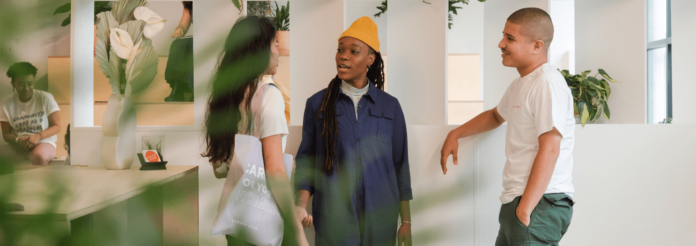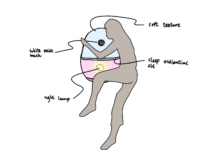Vice, by Taylor Hosking, Nov 12, 2019.
PHOTO COURTESY OF ETHEL’S CLUB BY AMANDLA BARAKA
As you walk up the graffiti-lined block in East Williamsburg, Brooklyn where Ethel’s Club, the first-ever private social and wellness club for people of color, is located, it’s hard to tell what to expect. Its popularity has soared presumably off the simple premise that it’s one of the first coworking and social spaces curated by young people of color for other young people of color. But the ways that status would meaningfully affect the club experience was still largely a mystery to most until this past weekend.
Every item in Ethel’s Club has a unique backstory to it, some advertised with a meticulously planted social media handle or QR code. The furniture was chosen, designed, and even upholstered by artisans of color; the free food in the kitchen and the goods for sale highlight smaller POC-run companies. Even the books in the meditation room feature writers of color analyzing racism from a mindfulness perspective.
“The club was born out of a kind of frustration and anger that no one else had done it,” 28-year-old founder Najla Austin explained. Coworking spaces like the women-focused members-only chain The Wing helped her see that it was possible to start a mainstream club that advertises specifically to one demographic.
Austin had never started a company from scratch before, but the club practically propelled itself into existence by popular demand. “We haven’t done any marketing. It’s all been us reckoning with what’s come to our doorstep,” she explained. Last November, she created an Instagram account for the club and posted a photo of a young Black woman with the simple caption, “the first space designed with people of color in mind.” Her post instantly hit a nerve, organically generating over 2,000 likes along with a flood of direct messages from people ready to join.
While the club could sound like a utopia in some ways, its limited membership and price tag makes it essentially inaccessible to the majority of young professionals of color in the city. A full yearly membership costs $195 a month or $2,100 a year, while a part-time membership that provides access to five events a month is $65 a month or $600 a year. While its full membership price may be on par with a number of other social clubs and coworking spaces, it’s not the most affordable for low-income emerging artists of color who could benefit from exposure to the club’s new networks. The incoming member cohort has a number of people in creative-adjacent fields like marketing and media, as well as some full-time artists. But Newman mentioned that the hope is to be able to offer more artist residencies and working memberships or trades as the club grows. The number of memberships available will likely be the first thing to change, though, as the club’s organizers are eager to expand the original location into other parts of its largely unoccupied building, as well as launch new locations around the city.
Analysis:
Ethyl’s club is an excellent example of reclaiming gentrified space for People of Color. I think a similar experience could be created in Columbus. I think Najla’s sentiment about people wanting something that has never existed for them is important, and I want to figure out what the “missing link” is in the Short North.




